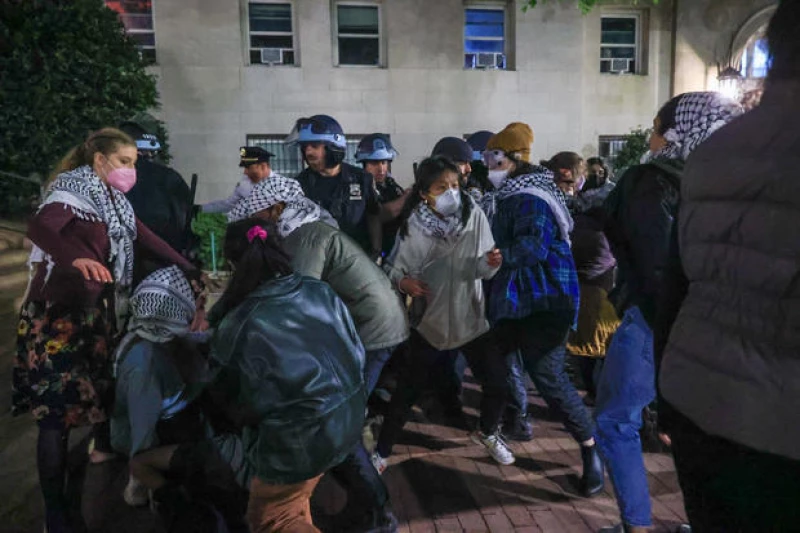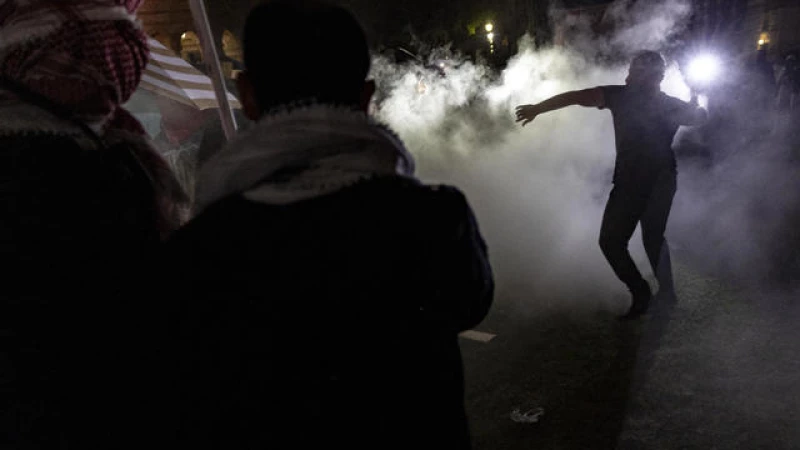The pro-Palestinian demonstration that paralyzed Columbia University ended in dramatic fashion, with police carrying riot shields bursting into a building that protesters took over the previous night and making dozens of arrests. On the other side of the country, clashes broke out early Wednesday between dueling groups at the University of California, Los Angeles (UCLA). And police and protesters clashed at the University of Arizona's Tuscon campus, according to the Arizona Daily Star.
New York City officers entered Columbia's campus late Tuesday after the university requested help, according to a statement released by a spokesperson. A tent encampment on the school's grounds was cleared, along with Hamilton Hall where a stream of officers used a ladder to climb through a second-floor window to get in.
Protesters calling on the Ivy League university to stop doing business with Israel or companies that support the war in Gaza had seized the hall about 20 hours earlier.
After reports surfaced that the university's Hamilton Hall had been seized, defaced, and barricaded, the university administration stated, "The decision to involve the NYPD was a response to the disruptive actions of the occupiers, rather than the cause they are advocating for. We have emphasized that the normal functioning of campus life cannot be continuously disrupted by individuals who flout the rules and laws."
Simultaneously, clashes erupted at UCLA overnight between groups supporting Palestine and Israel. Riot police in protective gear formed a barrier but refrained from immediate intervention.
Violence escalated as individuals hurled chairs, pushed, and kicked each other. Some individuals brandished sticks and assaulted others. Prior to police intervention, a cluster of individuals ganged up on a person on the ground, subjecting them to a brutal assault until bystanders intervened.

"Appalling acts of violence took place at the encampment last night, prompting us to seek law enforcement assistance," stated Mary Osako, a senior official at UCLA, in an interview with the campus publication, the Daily Bruin.
Los Angeles Mayor Karen Bass engaged in discussions with the university's chancellor and assured that the police would respond to the university's appeal, as per a statement on the social media platform X by her spokesperson, Zach Seidl.
Violent clashes erupted just outside a tent encampment, as pro-Palestinian protesters set up barricades and plywood for protection, while counter-protesters attempted to dismantle them.
Security measures were increased on Tuesday at the campus following reports of "physical altercations" between different groups of protesters.
Similar incidents have occurred at various campuses across the country in the past two weeks, resulting in confrontations and over 1,000 arrests. In some cases, university officials and protest leaders have reached agreements to minimize disruptions to campus activities and upcoming graduation ceremonies.
Meanwhile, near Columbia University, at The City College of New York, police intervened by removing a Palestinian flag from the flagpole, replacing it with the American flag.
Brown University, another member of the Ivy League, reached an agreement Tuesday with protesters on its Rhode Island campus. Demonstrators said they would close their encampment in exchange for administrators taking a vote to consider divestment from Israel in October. The compromise appeared to mark the first time a U.S. college has agreed to vote on divestment in the wake of the protests.
The Arizona Daily Star says officers in riot gear and gas masks fired what they called non-lethal chemical munition weapons as they moved in on demonstrators at the University of Arizona's Tucson campus. The paper says some arrests were made and "shoving matches break out between some protesters and advancing officers, and a barrage of items is thrown in the air, toward the officers, in the loud, chaotic scene" before protesters retreated and the encampment was broken up.
Columbia's police action happened on the 56th anniversary of a similar move to quash an occupation of Hamilton Hall by students protesting racism and the Vietnam War.
The police department earlier Tuesday said officers wouldn't enter the grounds without the college administration's request or an imminent emergency. Now, law enforcement will be there through May 17, the end of the university's commencement events.
In a letter to senior NYPD officials, Columbia President Minouche Shafik said the administration made the request that police remove protesters from the occupied building and a nearby tent encampment "with the utmost regret."
President Biden believes students occupying an academic building is "absolutely the wrong approach," said National Security Council spokesperson John Kirby.
Later, former President Donald Trump called into Sean Hannity's show on the Fox News Channel to comment on Columbia's turmoil as live footage of police clearing Hamilton Hall aired. Trump praised the officers. "But it should never have gotten to this," he told Hannity.
In response to Israel's offensive in Gaza following a deadly attack by Hamas on southern Israel on Oct. 7, nationwide campus protests kicked off at Columbia. The militants' actions resulted in the deaths of approximately 1,200 people, mostly civilians, and the taking of around 250 hostages. Israel, determined to eradicate Hamas, has reportedly killed over 34,000 Palestinians in the Gaza Strip, as per the local health ministry.
Amidst ongoing cease-fire negotiations, the impact of these talks on the protests remains uncertain.
While Israel and its supporters have condemned the university protests as antisemitic, critics of Israel argue that such accusations are used to suppress dissent. Despite instances of protesters making antisemitic comments or threats of violence captured on camera, organizers, including some from the Jewish community, maintain that the protests are a peaceful movement advocating for Palestinian rights and denouncing the war.







